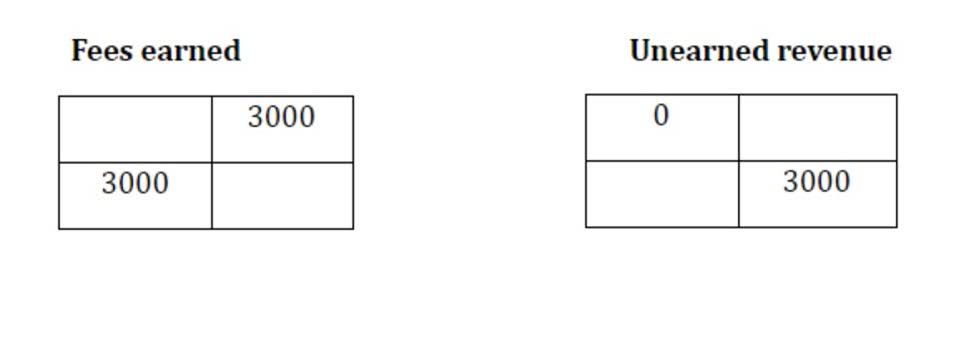
Rent is often paid a month ahead, which means that each payment is considered unearned revenue until the following month. Under the Internal Revenue Code, unearned fees are typically not included in taxable income until earned, offering a temporary tax advantage by reducing current period taxable income. However, companies must ensure compliance with tax regulations, which vary across jurisdictions. Unearned revenue is an obligation, not an asset, and is recorded on a firm’s balance sheet. Unearned income is recognised when there is proof of actual usage, which is a variant of the revenue detection method mentioned in the previous example. Europa Plowing, for example, would have chosen to recognise the unearned revenue based on the estimate that it will plough for XYZ 20 times over the winter.
Unearned Revenues Vs. Prepaid Expenses – Key Different Explained

This means that expenses should be matched with the revenue they help generate to provide a clearer look at financial performance. Deferred revenue is typically reported as a current liability on a company’s balance sheet because prepayment terms are typically for 12 months or less. Unearned revenue is originally entered in the books as a debit to the cash account and a credit to the unearned revenue account. Unearned revenue is reported on a business’s balance sheet, an important financial statement usually generated with accounting software. When the business provides the good or service, the unearned revenue account is decreased with a debit and the revenue account is increased with a credit.
- For instance, a construction company may receive progress payments, recorded as unearned until specific project milestones are achieved.
- Thus, if it plows five times during the first month of the winter, it could reasonably justify recognizing 25% of the unearned revenue (calculated as 5/20).
- Then, you’ll always know how much cash you have on hand, which clients have paid, and who you still owe services to.
- This is money paid to a business in advance, before it actually provides goods or services to a client.
- Baremetrics integrates directly with your payment processor, so information about your customers is automatically piped into the Baremetrics dashboards.
Can You Have Deferred Revenue in Cash Basis Accounting?
Once deferred revenue recognition takes place, it comes off the balance sheet. In accrual accounting, assets need equal liabilities, in the same period. Unearned fees are initially recognized as liabilities on the balance sheet, representing obligations to deliver future goods or services. This adheres to the accrual basis of accounting, ensuring income and expenses are recorded when they occur.

Unearned Revenue: What It Is, How It Is Recorded and Reported

Since service is owed, it is considered a short-term or long-term liability. Once revenue recognition occurs, it is earned revenue and becomes income. retained earnings Companies often receive payments in advance for various reasons such as subscription-based services, long-term contracts, or pre-orders.

As a result, any corporation that has already taken payment without providing the product is liable for excessive revenue. The firm will still owe the money to Accounting For Architects the consumer if it fails to fulfil. Unearned revenues are often categorised as short-term debts because the debt is generally satisfied in less than one year. However, where the supply of products or services is expected to take more than one year, the unearned revenue may be recorded as long-term debt. This case of recognizing unearned revenue as revenue is a highly risky area in terms of audit engagements because revenue accounts are the highest figures in the financial statements in most cases. Unearned revenue is a liability because there is a chance of a refund.
- Understanding these effects is vital for businesses that regularly receive advance payments.
- This means that expenses should be matched with the revenue they help generate to provide a clearer look at financial performance.
- With the provider and customer agreeing to delivery of a services or goods, at a specified time, for a specified price.
- This reduces the unearned revenue account and increases the revenue account.
- Businesses that receive upfront payments for goods and services must ensure that they deliver the goods and services to customers when due.
- If products or services delivered are partial to the total amount of the whole amount, only a partial amount is debited to the current liability account while crediting the revenue earned account.
Adjust the entry in your financial records by moving the revenue from unearned revenue on the balance sheet to earned revenue on the profit and loss statement. Unearned revenue, also called deferred revenue or advanced payment, is money that has been paid to your business for goods or services that you have not yet delivered. Essentially, it’s a cash prepayment in exchange for the promise of goods or services. Prepaid revenue is recorded as a credit to an unearned revenue document and a debit to the cash document because it is an obligation for the company. Generally accepted accounting principles are also broken if revenue is not recorded in the same accounting period as expenses are paid.
How to Test Completeness of Accounts Payable

The accounting standards require companies to record unearned revenues as liabilities and not as actual revenues. However, companies still need to record the cash received from their is unearned revenue a current liability customers to reflect a true and fair position on their financial statements. Until the company makes the sale, the amount paid by the customer is an obligation that will result in a future economic outflow. Unearned revenue is a liability for the recipient of the payment, so the initial entry is a debit to the cash account and a credit to the unearned revenue account. As a company earns the revenue, it reduces the balance in the unearned revenue account (with a debit) and increases the balance in the revenue account (with a credit). The unearned revenue account is usually classified as a current liability on the balance sheet.
Unearned Revenue and Accounting Periods
This decreases your unearned revenue liability because you performed the service. This is money paid to a business in advance, before it actually provides goods or services to a client. When the goods or services are provided, an adjusting entry is made. Unearned revenue is helpful to cash flow, according to Accounting Coach. For example, a small business quotes a customer $500 to install a vanity. The customer chooses to pay the full amount before the work starts, so the income is recorded as a $500 debit in the cash account and a $500 credit in the ‘unearned revenue’ account.
